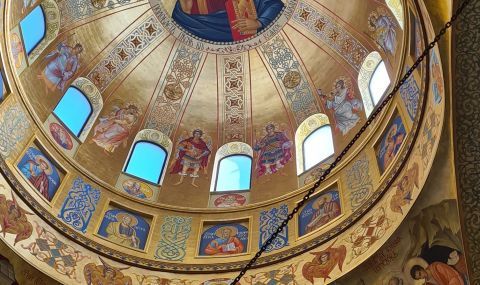The Sixth Ecumenical Council was convened in Constantinople under Emperor Constantine Pogonatus, at which council 170 bishops attended.
The Council was convened against the false teachings of the heretics – monothelites, who, although they recognized two natures in Jesus Christ – Divine and human, asserting the existence of only the Divine will.
After the Fifth Ecumenical Council, the unrest, instigated by Monothelites, continued and threatened the entire Byzantine Empire with great danger. Emperor Heraclius, desiring reconciliation, decided to persuade the Orthodox to yield to the Monothelites and by the power of his authority ordered that one will be recognized in Jesus Christ in both natures.
Patriarch Sophronius of Jerusalem and the monk Maximus the Confessor of Constantinople appeared as defenders and clarifiers of the true teaching of the Church, whose tongue and hand were cut off because of his firmness in faith.
The sixth ecumenical council condemned and rejected the heresy of the Monothelites and decided to recognize two natures in Jesus Christ – Divine and human, and by these two natures – two wills, but so that the human will in Christ is not opposed, but obedient to His Divine will.
It is worthy of attention that at this Council the Roman Pope Honorius, who recognized the doctrine of one will, was excommunicated together with the other heretics...
The definition of the Council was also signed by the Roman delegates – presbyters Theodore and George and deacon John. This clearly shows that the highest authority in the Church belongs to the Ecumenical Council and not to the Pope.
After 11 years, the Council again began its meetings in the royal palaces, called Trupsky, to decide the questions mainly related to the ecclesiastical deaconry (good governance).
In this respect, it seemed to supplement the Fifth and Sixth Ecumenical Councils, which is why it is called the Fifth-Sixth.
The council approved rules by which the Church should be governed, namely: 85 rules of the holy apostles, rules of the six ecumenical and seven local councils and the rules of 13 fathers of the Church. These rules were subsequently supplemented by the Seventh Ecumenical Council and by two more local councils, which compiled the so-called “Nomocanon", and in Russian the “Kormchaya kniga", which represents the basis of the ecclesiastical governance of the Orthodox Church.
At this Council, some innovations in the Roman Church were condemned, inconsistent with the spirit of the decrees of the Universal Church, namely: the compulsion of celibacy for priests and deacons, strict fasting on the Sabbaths of Great Lent.
We recall that in the summer of 680 the Byzantine emperor Constantine IV Pogonatus (668-685) launched a campaign against the Bulgarians. The defeat of the Byzantines ended with the conclusion of a peace treaty in the summer of 681. in Constantinople, through which Asparukh's Bulgaria was recognized by Byzantium. With this document, Byzantium cedes to Bulgaria the area of Lower Mysia up to the river Iskar, but without the city of Odessos and the surrounding coast.
This was actually formal, since Byzantine power over these lands was effectively absent due to continuous barbarian invasions and permanent waves of Slavic settlers. At the same time, Bulgaria agrees to cease raids beyond Stara Planina. Trade relations between the two countries have also been settled. Having made peace with Constantine IV Pogonatus,
Asparuch did not trouble Byzantium until 686, when Pogonatus died of dysentery.
In 681, the First Bulgarian State was founded, which reached its heyday in its development at the beginning of the 10th century and exerted a great influence on the Eastern European nations through its literary schools and literature.
